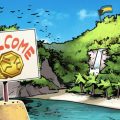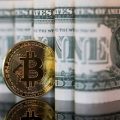Russian Raiffeisenbank said that from April 1 it will stop accepting and extending deposits in dollars due toFed rate cut.
The changes will affect nine types of deposits. At the same time, bank customers will still be able to keep dollars in current accounts. Fees for servicing current dollar bills will not be charged.
«In connection with the emergency Fed rate cutUSA Raiffeisenbank is forced to change the conditions for accepting and prolonging deposits in US dollars. From April 1, we will cancel accepting deposits in this currency. Also, extensions for existing deposits will be cancelled. After the end of the deposit period, the funds, along with interest, will be transferred to the account from which the deposit was opened»,- the message says.
Earlier, the Federal Committee for Open Market Operations decided to reduce the target range of rates for federal funds to 0-0.25% in the fight against financial risks due to coronavirus.
Independent expert Mansur Huseynov calls the Raiffeisenbank decision quite expected.
«The decision on deposit rates is madeby the bank's treasury, based on the cost of available funding and assets (loan portfolio, etc.). As a general rule, banks strive to maintain a balance between currencies - if there are loans in dollars, they need to attract deposits in dollars. Probably, the bank now has an excess of borrowed dollars, and lending in foreign currency is not growing. Accordingly, I don’t see anything surprising in such a decision by Raiffeisenbank,— he said in a comment to ForkLog.
Huseynov also added that a similar decision by other Russian banks will be made taking into account the market situation.
At the time of writing, the dollar exchange rate in the Russian Federation is 79.98 rubles.
Meanwhile, in Ukraine, several commercial banks reported a shortage of foreign cash at the box office.
Since March 18, PrivatBank transferred all currency exchange operations for individuals to non-cash format through a mobile bank, an online version of Privat24 and a network of self-service terminals.
As explained in the press service of «Privat»,priority for online currency exchange transactions is introduced for the safety of clients during the period of quarantine measures against coronavirus. These measures will remain in effect until the restoration of international air traffic and the supply of currency banknotes to Ukraine from abroad.
Without limitation, cash currency at the PrivatBank cash desks will be able to receive owners of foreign currency deposits, the validity of which expires, and only by prior order of foreign currency funds.
Alfa Bank also stopped issuing cash dollars:
«The issuance of US dollar cash from any client accounts (current, including card, deposit, savings) is temporarily suspended. Transactions with euro cash – no changes»,– notes the bank’s press service.
Representatives of the NBU earlier issued a statement that due to the coronavirus in Ukraine, interruptions in the delivery of banknotes to other financial institutions are expected.
«In recent days, we have been observing signs of a shortage of cash in bank cash desks. This is caused by an increase in the population’s demand for cash currency»,– noted in the National Bank.
At the same time, according to the regulator, $ 8 billion of non-cash currency is concentrated on correspondent accounts of banks.
It is noteworthy that all cash received from banks until going into circulation will be stored without movement for two weeks, that is, the incubation period of the coronavirus infection.
«The cash that will come fromcommercial banks will not be processed for two weeks to protect our employees, and only after that the cycle will begin. That is, the cash that comes from the street on the second day will not get there. We have enough cash in storage to supply commercial banks and ATMs with normal, high-quality cash»,- said the head of the NBU Yakov Smoliy.
The NBU also announced its readiness to disinfect banknotes in the vault.
The current situation has already generated a rush of demand for currency among Kievans, Bitcoin enthusiast Andrei Veliky said in a comment to ForkLog:
«As soon as a crisis situation occurs,There is a shortage of us in the country. There is a shortage of currency if the exchange rate goes in one direction, or a shortage of the hryvnia if it goes in the other direction. And if suddenly the state is going to create the appearance of stability and asks banks to make the jump in the exchange rate less noticeable, then against the backdrop of a surge in activity on the gray market, friendly cashiers at the banks’ cash desks immediately refuse transactions in a direction unfavorable for themselves. And now, when the hryvnia is flying down like any self-respecting altcoin, there is a rush on the market in Kyiv.
According to him, the idea of a NBU with a quarantine of banknotes will have a detrimental effect on the country's foreign exchange market.
«The incubation period is two weeks,proposed by the NBU is such surrealism that it doesn’t even occur to me how they can offer it in all seriousness. This will not only make the situation with the availability of currency and the hype around it worse, it will provide an official explanation for its shortage. And then we will instantly see the situation, as during the rapid growth from 8 UAH to the dollar: one number was written on the board, but in fact it is impossible to buy for it, and right there, in the next closed room, the currency will be shipped at completely different prices. I’ll finish with one more piece of advice that has helped me out many times - in any unclear situation, buy bitcoin»,- said the expert.
Quarantine on the territory of Ukraine was announced until April 3, but can be extended by decision of the country's leadership.
Earlier, experts told ForkLog how effective the measures of the Central Bank of the Russian Federation will be to protect the economy from volatility in the financial and commodity markets.





